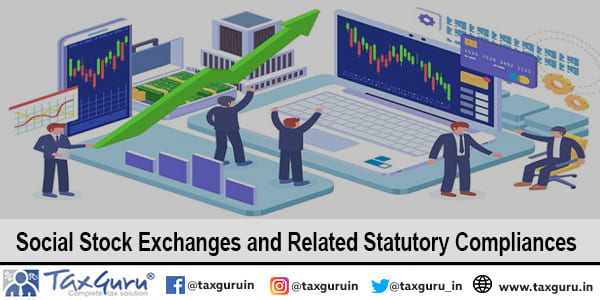In recent times, with “Social Stock Exchanges” being the buzz word amongst both Professionals and the Social Sector, there still exists a lack of knowledge on the regulatory framework and the associated compliances.
As on date, there exists 5 listed Non-Profit Organizations listed on the National Stock Exchange administered Social Stock Exchange (“NSE SSE”) and having raised approximately INR 8 crore. This article aims to shed light on the intricacies of SSEs, including eligibility criteria, compliance requirements, and the significance of social impact assessment.
DECODING: SOCIAL ENTERPRISES
Introduced by way of the SEBI (Issue of Capital and Disclosure Requirements) (Third Amendment) Regulations, 2022 (“ICDR Regulations”), Chapter X-A was notified, thereby defining Social Enterprise as a For-Profit Organization or a Not-For-Profit Organization meeting the specified eligibility criteria.
For-Profit Social Enterprises mean,
a. Company, or,
b. Body Corporate operating for Profit.
Note that this definition expressly bars Companies incorporated under Section 8 of the Companies Act, 2013.
Not-For-Profit Organizations mean,
a. Any registered Charitable Trust under the Indian Trusts Act, 1882, or,
b. Any registered Charitable Trust under the Public Trust statute of relevant state, or,
c. Any Charitable Society registered under the Societies Registration Act, or,
d. Any Company incorporated under Section 8 of the Companies Act, 2013.
The concept of “Social Stock Exchange” is completely different to that of existing Stock Exchanges. A separate segment of a recognized stock Exchange, bearing Nationwide Trading Terminals and permitted to register Not-For-Profit Organizations and subsequently list the securities issued on such platform.
In most cases, Social Enterprises lack adequate fund-raising and to bridge this gap, Social Stock Exchange (“SSE”) was introduced.
Further, it provides transparency and serves as a mark of credibility for prospective Social Enterprises, willing to raise funds.

UNDERSTANDING THE ELIGIBLITY:
(1) Indulging in any of the activities, as has been specified in Regulation 292E of the ICDR Regulations;
(2) Social Enterprise shall target the undeserved or less privileged part of the population;
(3) At least 67% of its eligible activities to be established through, one or more of the criteria listed herein below:
– at least 67% of the immediately preceding 3-years average revenue to come from providing eligible activities to members of the target population,
– at least 67% of the immediately preceding 3-years average expenditure has been incurred for providing eligible activities to members of the target population,
– at least 67% of the customer base to whom eligible activities has been provided, for the immediately preceding 3-year average of the total customer base and/or total number of beneficiaries .
GOVERNING REGULATIONS:
1) Chapter X-A of the SEBI (ICDR) Regulations: Governing the fund-raising process for both NPOs and FPEs.
2) Chapter IX-A of the SEBI (Listing Obligations and Disclosure Requirements) Regulations, 2015: Governing Disclosure Requirements for NPOs and FPEs upon getting listed on the Social Stock Exchange.
3) SEBI (Alternative Investment Funds) (Third Amendment) Regulations, 2022: Governing fund-raising via investment in Social Impact Funds.
AVAILABLE FUND-RAISING OPTIONS:
| For-Profit Enterprises | Not-For-Profit Organizations |
| Issuance of Equity Shares on the Main Board, SME Platform or Innovators Growth Platform.
Equity shares issued to an Alternative Investment Fund, including a Social Impact Fund, qualifies as well. |
Issuance of Zero-Coupon, Zero-Principal Instruments (“ZCZP”) to the Eligible Investors. |
| Issuance of debt securities. | Donations through Mutual Fund Schemes. |
| Any other means as may be specified by SEBI. | |
INTRODUCTION OF “SOCIAL IMPACT ASSESSMENT”:
The conduct of mandatory “Social Audit”, now referred to as “Social Impact Assessment” was originally mandated by way of insertion of Chapter IX-A in the SEBI (Listing Obligations and Disclosure Requirements) Regulations, 2015 (“LODR Regulations”).
Social Impact Assessment is a manner of independently scrutinizing the social impact of the Enterprises, number of end-beneficiaries, administrative overheads and so on.
All Enterprises, either registered or having raised funds through SSE or any other Stock Exchange, are mandated to submit an Annual Impact Report.
The Annual Impact Report shall be assessed by a Social Impact Assessment Firm, employing a Social Impact Assessor.
Timeline?
Within 90 days from the conclusion of the Financial Year.
COMPLIANCE CHECKLIST FOR BOTH REGISTERED AND LISTED SOCIAL ENTERPRISES, FOR FY 2024-25:
| Sl. No | Reference | Particulars of Compliance | Date on which intimation will be sent | To be sent to | Remarks |
| Compliances applicable to both Listed and Registered SEs. | |||||
| 1. | Chapter IX-A of the SEBI (LODR) Regulations, 2015, read with SEBI Circular on Framework on Social Stock Exchange dated September 19, 2022. | Submission of Annual Impact Report with the Stock Exchange. | On or before June 29, 2024. | NSE SSE | Within 90 days from the end of the Financial Year. |
| 2. | SEBI Circular on Framework on Social Stock Exchange dated September 19, 2022. | Submission of Annual Disclosures, based on the following aspects:
A. General Aspects. B. Governance Aspects. C. Financial Aspects. D. Guidance Note on the above aspects. |
On or before May 30, 2024. | NSE SSE | Within 60 days from the end of the Financial Year. |
| Post-Listing Compliances | |||||
| 3. | Regulation 91D of the SEBI (LODR) Regulations, 2015. | Framing a policy for determination of materiality. | Upon Listing. | – Board of Directors OR Board of Trustees.
– Website of the Social Enterprise. – NSE SSE. |
The listed entity shall make the disclosure as soon as possible, but not later than 7 days from the date of event occurrence. |
| 4. | Regulation 91D of the SEBI (LODR) Regulations, 2015. | Designation of a Key Managerial Personnel for determination of materiality and disclosing his contact details to the Stock Exchange. | Upon Listing. | NSE SSE | This may be incorporated within the Materiality Policy itself. |
| 5. | Regulation 91F of the SEBI (LODR) Regulations read with SEBI Circular dated September 19, 2022. | Quarterly Statement of Utilisation of Funds. | On or before May 15, 2024.
On or before August 14, 2024. On or before November 14, 2024. On or before February 14, 2025. |
– Board of Directors OR Board of Trustees
– Website of the Social Enterprise. – NSE SSE. |
Within 45 days from the end of the quarter.
Till the time the funds raised have been fully utilised. |
As India significantly transcends into spreading awareness about adherence with the Sustainability Development Goals and empowering the Social Sector, the Securities Market Regulator is rapidly stepping up its game, by way of streamlining the fund-raising process and providing necessary clarifications.
To promote knowledge and support amongst the Social Sector, Professionals are expected to play an instrumental role in educating about funding via Social Stock Exchange and ensuring adherence to good governance.
*****
In case of any further queries, feel free to reach out at antikamukherjee@gmail.com.





